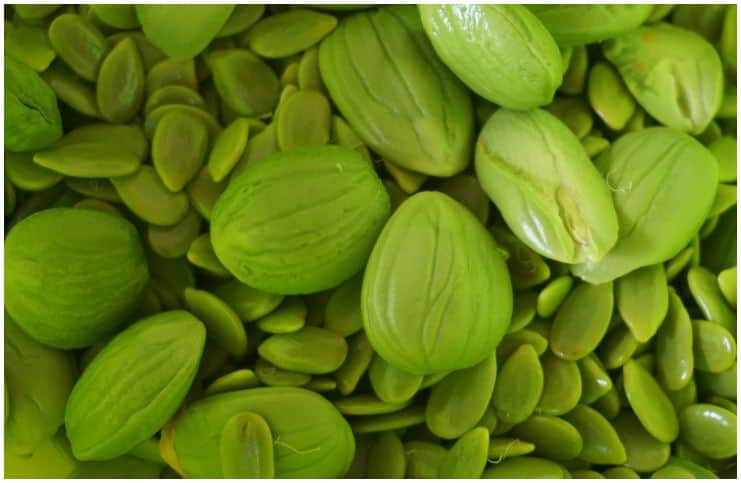Petai (Parkia speciosa) or Stink Bean – Side Effects & Health Benefits:
Parkia speciosa (stink bean, petai, bitter bean, stinker, or twisted cluster bean) is a plant of the genus Parkia in the family Fabaceae.
It has been used in folk medicine to treat hypertension, diabetes, and kidney problems.
They are best when consumed with other strongly flavored foods such as garlic, chili peppers, dried shrimp, or shrimp paste, as in sambal petai.
It bears long, flat edible beans with bright green seeds the size and shape of plump almonds, which have a somewhat peculiar smell, similar to (but stronger than) that of the Shiitake mushroom, characterized by some as being similar to natural gas.
When young, the pods are flat because the seeds have not yet developed, and they hang like a bunch of lightly twisted ribbons, pale green, almost translucent.
At this stage, they can be eaten raw, fried, or pickled. Young tender pods with immature beans can be used whole in stir-fried dishes.
The petai tree can grow to about 30 meters (90 feet). The tree bears flowers in a light-bulb-shaped mass at the end of long stalks.
The flowers secrete a nectar that attracts bats and other pollinators. The tiny flowers mature and die.
Long, twisted, translucent pods emerge in a cluster of seven or eight pods. Beans or seeds will reside within the pods when the latter are mature.
Nutrition Facts
The seeds contain (per 100 g edible portion):
- protein 6.0-27.5 g;
- fat 1.6-13.3 g;
- carbohydrate 13.2-52.9 g;
- crude fiber 1.7-2.0 g;
- energy 91.0-441.5 kcal;
- calcium 108.0-265.1 mg;
- iron 2.2-2.7 mg;
- potassium 341.0 mg;
- phosphorus 115.0 mg;
- manganese 42.0 ppm;
- magnesium 29.0 mg;
- copper 36.7 ppm;
- zinc 8.2 ppm;
- vitamin C 19.3 mg;
- α-tocopherol 4.15 mg;
- thiamin 0.28 mg. (1)
Also, a high concentration of tannin (an astringent, polyphenolic biomolecule) was detected in its seed coats and pods compared to other vegetables.
Health Benefits of Petai (Parkia speciosa)
Diabetes
Diabetes is affecting millions of people today and it has become difficult to manage the symptoms of diabetes.
A 2008 study at the University College of Medical Sciences, Malaysia, showed chloroform extracts produced a significant depression of blood glucose levels in alloxan-induced diabetic rats.
The occurrence of ß-sitosterol, stigmasterol, and stimast-4-en-3-one was reported for the first time and may have a potential for new hypoglycemic agents.
An aqueous seed extract of P. speciosa was investigated for hypoglycemic effects on normal rats. Results concluded a substantial blood glucose reduction effect. (2)
Antioxidant Properties
This capacity was relatively very high in the pods and seeds mixture, where the methanolic extract had greater capacities than the aqueous extract for all three assays.
The methanolic extract contains hydrophilic and intermediate hydrophilic substances, whereas the aqueous extract contains hydrophilic constituents only.
This difference explains the better capacity of the methanolic extract.
Antioxidant activity was also present in the leaves and seeds of the plant, but with lower activities when compared to the activity in the pod and seed mixtures.
This suggests that the pods retain a larger antioxidant content than the other parts of the plant.
Flavonoids, which possess an antioxidant capacity, were detected in the ethanolic extract of the seeds, but none was found in its methanolic extract. (3)
Gastroprotective Effects
There is a study carried out in 2013, which examined the gastroprotective effects of Parkia speciosa against ethanol-induced gastric mucosal injury in rats.
The analysis revealed notable increases in the levels of the antioxidant defense enzymes glutathione (GSH) and superoxide dismutase (SOD) in the gastric mucosal homogenate, whereas that of a lipid peroxidation marker (MDA) was considerably decreased.
In addition, no symptoms of toxicity or death were observed during acute toxicity tests. (4)
Rich In Carbohydrates And Dietary Fiber
The seeds contain high amounts of complex carbohydrates.
Carbohydrates provide the energy required for your daily activities (1 gram of carbohydrates provides four calories of energy). They also benefit your heart and promote a healthy digestive system.
Fiber-rich foods add bulk to your diet, making you feel full more quickly and satisfying your appetite for longer.
Did you know that eating extra fiber in our diet slows down the absorption of carbohydrates in the digestive system?
As a consequence, we will feel full longer and be less likely to overeat throughout the day.
Better Sleep And Moods
Sleep deprivation or poor sleep quality is a frequent cause of moodiness and irritability. It is estimated that 40 to 50 percent of menopausal women complain about sleep problems.
These beans can improve sleep quality due to their high content of tryptophan.
Consuming foods high in this essential amino acid induces sleep, helps bring on natural calming effects, burns more body fat, and can also help fight anxiety, which will ultimately lead to a better mood.
Heart Health
Potassium is an essential mineral that you don’t want to run low on for any amount of time. For starters, it is required for maintaining fluid in the body and electrolyte balance.
Increased levels of this important nutrient allow more vital oxygen to reach the brain, hence increasing cognitive function and stimulating neural activity.
Furthermore, the World Health Organization suggests that this mineral promotes cardiovascular health and can help reduce blood pressure.
Minimize Morning Sickness
Morning sickness typically starts around week six of pregnancy and disappears around week twelve, however, different women will have different experiences.
It is frequently one of the first signs of pregnancy.
Approximately 50% of women experience vomiting early in pregnancy and about 70% experience nausea.
Eating these beans can help keep glycemia levels stabșe and avoid vomiting and nausea.
Side Effects of Petai
Though the plant has a wide range of beneficial health benefits, it is advisable not to consume it too much at a time, because it can harm the kidneys. The reason is Parkia speciosa contains a lot of amino acids.
Uric acid is produced naturally when your body breaks down the purines. Similar to other legumes, these beans contain moderate levels of purines.
However, soaking the beans reduces uric acid considerably, by more than 90 percent. Furthermore, recent studies suggest that the purine content of vegetables and beans does not aggravate the symptoms of gout.
READ THIS NEXT:
Ajwain (Carom Seeds) – Side Effects
Job’s Tears (Coix Seed) – Side Effects & Health Benefits
Arrowroot Powder – Facts, Uses, Health Benefits, Substitute, Tea, Side Effects




